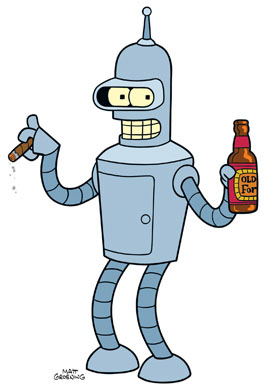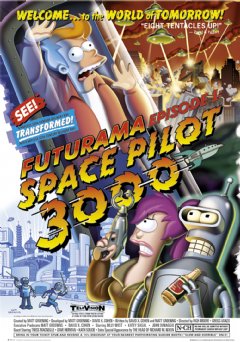
Beginning in 1867, a lichen was understood as a symbiosis of an algae or cyanobacteria, living among filaments of multiple fungi species. In 2016, new research by T. Spribille et al. revealed a third partner, a yeast imbedded in the lichen cortex or "skin."

Futurama is an American animated science fiction sitcom created by Matt Groening for the Fox Broadcasting Company and later revived by Comedy Central, and then Hulu. The series follows the adventures of slacker Philip J. Fry, who is cryogenically preserved for 1,000 years and revived on December 31, 2999. Fry finds work at the interplanetary delivery company Planet Express, working alongside one-eyed mutant Leela and robot Bender. The series was envisioned by Groening in the mid-1990s while working on The Simpsons; he brought David X. Cohen aboard to develop storylines and characters to pitch the show to Fox.

Bender Bending Rodríguez is one of the main characters in the animated television series Futurama. He was conceived by the series' creators Matt Groening and David X. Cohen, and is voiced by John DiMaggio. He fulfills a comic, antihero-type role in the show, and is described by fellow character Leela as an "alcoholic, whore-mongering, chain-smoking gambler".

Turanga Leela is a fictional character from the animated television series Futurama. Leela is spaceship captain, pilot, and head of all aviation services on board the Planet Express Ship. Throughout the series, she has an on-again, off-again relationship with and later on got engaged to Philip J. Fry, the central character in the series. She is also Elena Fry's mother while she is the biological mother of Axel, Mandy and Newt Kroker. The character, voiced by Katey Sagal, is named after the Turangalîla-Symphonie by Olivier Messiaen. She is one of the few characters in the cast to routinely display competence and the ability to command, and routinely saves the rest of the cast from disaster. However, she suffers extreme self-doubt because she has only one eye and grew up as a bullied orphan. She first believes herself an alien, but later finds out she is the least-mutated sewer mutant in the history of 31st-century Earth. Her family parodies aspects of pollution and undesirability associated with industrial New Jersey when compared with New York City.

"Space Pilot 3000" is the pilot episode of the American animated television series Futurama. It originally aired on the Fox network in the United States on March 28, 1999. The episode focuses on the cryogenic freezing of the series protagonist, Philip J. Fry, and the events when he awakens 1,000 years in the future. Series regulars are introduced and the futuristic setting, inspired by a variety of classic science fiction series from The Jetsons to Star Trek, is revealed. It also sets the stage for many of the events to follow in the series, foreshadowing plot points from the third and fourth seasons.
"The Honking" is the eighteenth episode in the second season of the American animated television series Futurama, and the 31st episode of the series overall. It originally aired on the Fox network in the United States on November 5, 2000. The title references the 1981 film The Howling. The episode is also a reference to the 1977 film The Car.
"That's Lobstertainment!" is the eighth episode in the third season of the American animated television series Futurama, and the 40th episode of the series overall. It originally aired on the Fox network in the United States on February 25, 2001.
"I Dated a Robot" is the fifteenth episode in the third season of the American animated television series Futurama, and the 47th episode of the series overall. It originally aired on the Fox network in the United States on May 13, 2001.
"Bender Should Not Be Allowed on TV" is the sixth episode in the fourth season of the American animated television series Futurama, and the 60th episode of the series overall. It originally aired on the Fox network in the United States on August 3, 2003. The episode's plot revolves around Bender's outlandish behavior on the television program All My Circuits; after he lands a spot on the show, he is quickly criticised by members of the public for setting a poor example for children. Bender eventually sees the critics' point of view after he realizes children imitated his behavior and stole his belongings, and sets out to put a stop to his own behavior.
"Bend Her" is the thirteenth episode in the fifth season of the American animated television series Futurama, and the 67th episode of the series overall. It originally aired on the Fox network in the United States on July 20, 2003. In the episode, Bender changes into a female robot and adopts the name Coilette.

Futurama: Bender's Big Score is a 2007 American animated science fiction comedy film based on the animated series Futurama. It was released in the United States on November 27, 2007. It was the first Futurama production since the original series finale "The Devil's Hands are Idle Playthings". Bender's Big Score, along with the three follow-up films, comprise season five of Futurama, with each film being separated into four episodes of the broadcast season. Bender's Big Score made its broadcast premiere on Comedy Central on March 23, 2008. The film was written by Ken Keeler, based on a story by Keeler and David X. Cohen, and directed by Dwayne Carey-Hill.
The animated science fiction show Futurama presents a satirical look at politics and current affairs in a number of its episodes. Series creator Matt Groening intended from the outset that Futurama would lampoon not only the conventions of science fiction, but elements of present-day life, serving as a form of political and social satire.
"The Silence of the Clamps" is the fourteenth episode in the sixth season of the American animated television series Futurama, and the 102nd episode of the series overall. It originally aired July 14, 2011 on Comedy Central. The episode was written by Eric Rogers and directed by Frank Marino. In the episode, Bender witnesses a brutal "clamping" committed by the Robot Mafia and is forced into witness protection after his identity is accidentally revealed. Meanwhile, Clamps, a member of the Robot Mafia, takes Bender's old job at Planet Express in an attempt to get information as to Bender's whereabouts.
"T.: The Terrestrial" is the sixteenth episode in the seventh season of the American animated television series Futurama, and the 130th episode of the series overall. It originally aired on Comedy Central on June 26, 2013. The episode was written by Josh Weinstein and directed by Lance Kramer. In the episode, Fry becomes marooned on a distant planet, where he befriends an inhabitant who helps protect him and find his way home.
"The Inhuman Torch" is the eighteenth episode in the seventh season of the American animated television series Futurama, and the 132nd episode of the series overall. It originally aired on Comedy Central on July 10, 2013. The episode was written by Dan Vebber and directed by Frank Marino. In the episode, Bender becomes a firefighter, and ends up housing a solar flare who wants to blow up the Earth from the inside.
"Calculon 2.0" is the twentieth episode in the seventh season of the American animated television series Futurama, and the 134th episode of the series overall. It originally aired on Comedy Central on July 24, 2013. The episode was written by Lewis Morton and directed by Stephen Sandoval. Calculon is backed up and put into the body of a new robot so he can return to All My Circuits, only to learn that his over-the-top acting was never appreciated.
"Murder on the Planet Express" is the twenty-fourth episode in the seventh season of the American animated television series Futurama, and the 138th episode of the series overall. It originally aired on Comedy Central on August 21, 2013. The episode was written by Lewis Morton and directed by Frank Marino. In this episode, the crew get trapped aboard the Planet Express ship with a horrific alien creature. The episode's title derives from Murder on the Orient Express and parodies Alien and The Thing.
"Stench and Stenchibility" is the twenty-fifth episode in the seventh season of the American animated television series Futurama, and the 139th episode of the series overall. It originally aired on Comedy Central on August 28, 2013. The episode was written by Eric Horsted and directed by Crystal Chesney-Thompson. In the episode, Dr. Zoidberg falls in love with a human flower merchant while Bender competes in a deadly tap-dancing contest.
Lichen anatomy and physiology is very different from the anatomy and physiology of the fungus and/or algae and/or cyanobacteria that make up the lichen when growing apart from the lichen, either naturally, or in culture. The fungal partner is called the mycobiont. The photosynthetic partner, algae or cyanobacteria, is called the photobiont. The body of a lichens that does not contain reproductive parts of the fungus is called the thallus. The thallus is different from those of either the fungus or alga growing separately. The fungus surrounds the algal cells, often enclosing them within complex fungal tissues unique to lichen associations. In many species the fungus penetrates the algal cell wall, forming penetration pegs or haustoria similar to those produced by pathogenic fungi. Lichens are capable of surviving extremely low levels of water content (poikilohydric). However, the re-configuration of membranes following a period of dehydration requires several minutes at least.





